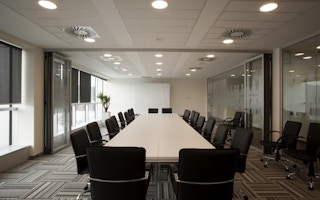Many leaders today may have become numb to the inconvenient truth about climate change. Despite the huge annual price tag of US$53 billion from natural and man-made disasters, half of which are from Asia-Pacific alone - investments continue to flood into this region. Asian businesses continue to flourish and mature, as does expanding bracket of middle-class consumers.
Yet, there is a more disturbing truth which many fail to realise - that businesses today are more vulnerable, more exposed than ever to shifts in the economy and disruptions within or outside their industries. In fact, the average ‘life’ of a company in recent decades has seen a massive decline. A business quoted on the S&P Index today has a life span of just 15 years, compared to the average of 60 years in the 1960s. While some of this is caused by corporate failure, this decline is also driven by market forces such as mergers and acquisitions; consolidation and change.
The fact is nobody can predict the future. Recognizing that our fast-changing environment can present new challenges and new opportunities is what progressive companies increasingly focus on today, and this has triggered the move for senior management to rethink their approach to long-term strategic thinking. In fact, long-term sustainability should be central to a business’ strategic development process, according to the latest research, Creating Resilient Strategies.
This year-long research, conducted using insights from senior employees at 16 global brands, including Jaguar-Rover, Cisco Systems, and Singapore’s City Developments Limited (CDL), Sembcorp Industries and Singapore Telecommunications Ltd (SingTel) - shed light on the challenges faced by business continuity teams today. The findings show that while some companies are alert to the volatile business environment, only a few are really looking out for long-term disruptive trends.
The power of disruptive thinking
“
The fact is nobody can predict the future. Recognizing that our fast-changing environment can present new challenges and new opportunities is what progressive companies increasingly focus on today, and this has triggered the move for senior management to rethink their approach to long-term strategic thinking. In fact, long-term sustainability should be central to a business’ strategic development process.
A reason why many companies do not actively engage beyond their traditional planning methods could be attributed to a common scenario of linear thinking within an organization – a situation where decisions are made by logic and rationality, thereby neglecting opportunities from unusual, spontaneous thinking.In fact it is hardly surprising that in Asia in particular, where rote learning and hierarchy are traditionally known traits in the corporate setting, the pursuit of abstract thinking and illogical reasoning might often be subdued or even stifled.
Yet, there is method to this madness. A great example of a new value chain created from such thinking is GlaxoSmithKline’s Horlicks Mission Health Mission programme in rural India. The simple idea of addressing malnutrition through the appointment of micro-distributors – who are in fact the women themselves in small villages - has not only greatly enhanced the livelihoods of communities in over 4,000 villages, it has also opened up a whole new distribution channel for the brand. Disruptive thinking is regarded today by some of the most advanced business thinkers as the exciting part about strategy planning. Choosing these kinds of ideas for growth opens the door to far-reaching long-term growth opportunities.
Sustainability objectives and business strategy go hand-in-hand
So how can long-term thinking be cultivated? This is where the role of the sustainability manager comes in. Instead of restricting strategic planning to mainstream business issues, the sustainability agenda applies broadband thinking that factors in the wider environment, social and governmental context. This inevitably puts the focus on unusual sources of inputs among stakeholders – with the society. Extensive public consultations and stakeholder engagement processes are some of the common ways in which organizations today, including governments and ministries, seek to understand their relationships with society better.
A good example of complex relationships with society being studied is the Singapore government’s efforts in driving the Singapore Conversation. The 2012 year-long exercise, led by the Prime Minister Lee Hsien Loong himself, involved capturing the diversity of views, aspirations and priorities of some 46,000 Singaporeans from all walks of life. On the corporate front, the Global Reporting Initiative (GRI) G4 Materiality exercise in Sustainability Reporting is a useful platform that businesses already use to identify pertinent stakeholder issues as part of their horizon planning journey.
Incorporating sustainability objectives across strategic planning can thus benefit the business significantly. Far from being an abstract process, this holistic approach is almost a natural, synergistic exercise that helps reap benefits while staying close to the ethos and culture of the organization.
As the Asian region continues to prosper, myriad shifting power structures, new social relationships and new priorities will continue to unfold. Companies investing in this growth will continue to alter the landscape which they operate in – through jobs, education, community outreach, and social interactions. The role of Asian businesses in navigating pro-active dialogues and unusual partnerships will be even more important moving into its new chapter.
The good news is, this could be the winning formula to power innovation and resilient growth for Asian businesses for generations beyond.
Junice Yeo is director of Corporate Citizenship’s Southeast Asia office. This article was written exclusively for Eco-Business.


















